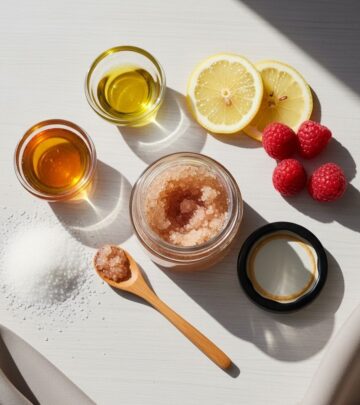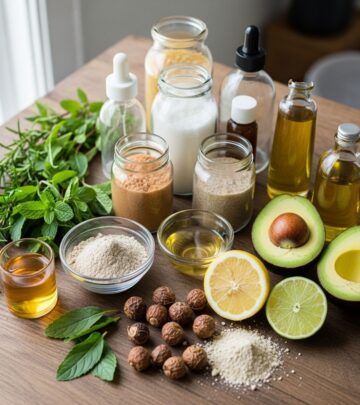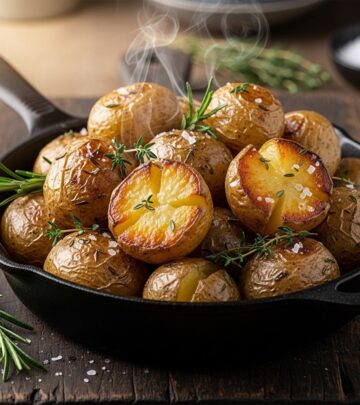Lemon Rosemary Scones: A Fragrant Twist on Classic Scones
Flaky, fruit-kissed pastries burst with bright flavor and effortless make-ahead convenience.

Scones are a beloved breakfast staple, and with hints of citrus and fresh herbs, they bring new energy to your morning table. Lemon rosemary scones combine the buttery richness of classic scones with the sunny brightness of lemon and the earthy aroma of rosemary. This recipe delivers a soft, tender crumb and a sweet glaze that makes each bite unforgettable.
Why You’ll Love Lemon Rosemary Scones
- Fresh, herbaceous flavor from rosemary and lemon zest
- Delightful texture—crisp-edged and soft inside
- Perfect for breakfast, brunch, or tea
- Freezer-friendly: Enjoy now or later
- Easy to customize with other herbs or citrus
Recipe Overview
This recipe is inspired by the original cream scone method, elevated with the addition of finely minced rosemary and plenty of lemon zest. The scones are finished with a glossy lemon-rosemary glaze that adds both visual appeal and a tangy-sweet punch.
| Prep Time | Cook Time | Total Time | Servings |
|---|---|---|---|
| 20 minutes | 18 minutes | ~40 minutes | 24 scones |
Ingredients
For the Scones
- 3 cups all-purpose flour
- 2/3 cup sugar
- 5 teaspoons baking powder
- 1/4 teaspoon salt
- 2 sticks (1/2 pound) unsalted butter, chilled and cut into pieces
- 1 large egg
- 1 cup heavy cream
- 1 tablespoon fresh rosemary, finely minced
- Zest of 1 lemon
For the Glaze
- 5 cups powdered sugar, sifted
- 1/2 cup whole milk (plus more for thinning if necessary)
- Zest and juice of 1 lemon
- 1 teaspoon fresh rosemary, finely minced
- Dash of salt
Step-by-Step Instructions
1. Prepare the Dry Ingredients
In a large mixing bowl, combine the flour, sugar, baking powder, and salt. Sift together to ensure there are no clumps, which makes for light, evenly baked scones.
2. Cut in the Butter
Add the chilled, cubed butter to the bowl. Use a pastry cutter or two knives to cut the butter into the flour mixture until it resembles coarse crumbs. This step is crucial—visible bits of butter create the flakiness that makes scones irresistible.
3. Mix the Wet Ingredients
In a separate bowl, whisk together the cream and egg. Stir in the lemon zest and finely minced rosemary. If you have time, let this mixture sit for 20–30 minutes to deepen the herbal flavor. This step infuses the cream with the essential oils from the zest and herbs, leading to a more aromatic finished scone.
4. Combine Wet and Dry Mixtures
Pour the wet ingredients into the bowl with the flour and butter mixture. Gently fold together using a fork until just combined. The mixture should look a bit crumbly—avoid overmixing, which can produce tough scones. If the dough is too dry to come together, splash in a tiny bit of cream, but err on the dry side for the best crumb.
5. Shape the Dough
Turn the dough out onto a floured work surface. Press it gently with your hands to form a rough rectangle shape. With a rolling pin, roll the dough out until it’s approximately 18 inches by 10 inches and about 3/4-inch thick.
6. Cut and Arrange
- Use a pizza cutter or sharp knife to trim any uneven edges, then cut the dough into 12 rectangles.
- Slice each rectangle diagonally, creating 24 triangles total.
- Transfer the triangles to two parchment-lined baking sheets, spacing them slightly apart.
7. Bake
Bake in a preheated oven at 350°F for 18–20 minutes or until the scones are just beginning to turn golden on the edges. Avoid overbaking to preserve their tender, moist crumb. Remove from the oven and allow to cool for at least 15 minutes before glazing.
Making the Lemon Rosemary Glaze
1. Prepare the Glaze
In a medium bowl, combine the sifted powdered sugar, whole milk, lemon juice, lemon zest, minced fresh rosemary, and a dash of salt. Whisk until smooth and glossy. For a stronger rosemary flavor, let the glaze sit for 15–20 minutes before using.
2. Glaze the Scones
When the scones are completely cool, dunk each one into the glaze to coat the tops. Allow excess glaze to drip back into the bowl. Set the glazed scones on a wire rack to let the topping set—about an hour is best for a firm, shiny finish.
Tips for Success
- Use cold butter: Cold, cubed butter creates flaky layers by releasing steam as it bakes.
- Rest the dough if possible: Refrigerating the unbaked scones for 15–20 minutes before baking makes for a taller, flakier scone.
- Don’t overwork the dough: Minimal mixing keeps the scones light and tender.
- Flavor boost: Letting the cream and herb mixture steep enhances the rosemary’s impact without overpowering the lemon.
Flavor & Ingredient Variations
- Swap herbs: Try thyme or basil for a different herbal note.
- Citrus alternatives: Substitute orange or lime zest.
- Additions: Fold in white chocolate chips, dried cranberries, or chopped nuts for extra flavor and texture.
- Dairy swaps: Substitute buttermilk or half-and-half if you don’t have heavy cream—expect a slightly different texture.
How to Serve Lemon Rosemary Scones
- Breakfast or brunch centerpiece: Serve fresh from the oven with coffee or tea.
- Afternoon tea: Pair with clotted cream or lemon curd.
- Make ahead: Scones taste best the day they’re made, but they can be stored in an airtight container at room temperature for up to 2 days.
- Freeze unbaked scones: Arrange cut triangles on a sheet tray, freeze until solid, then transfer to a resealable bag. Bake from frozen, adding a couple extra minutes to the baking time.
Nutritional Information (Per Scone, Approximate)
| Calories | Fat | Sugar | Protein | Carbohydrates |
|---|---|---|---|---|
| 220 | 11g | 18g | 2g | 29g |
*Values are estimates, based on standard recipes and may vary depending on specific ingredients and portion sizes.
Storing & Freezing
- To store: Keep cooled, glazed scones in an airtight container at room temperature for up to 2 days.
- To freeze: Wrap individual scones tightly and freeze for up to 1 month. Thaw at room temperature, then gently warm in a low oven before serving.
Frequently Asked Questions (FAQ)
Can I make lemon rosemary scones ahead of time?
Yes, you can make them the day before and store in an airtight container. For ultimate freshness, consider freezing unbaked scones and baking them straight from the freezer as needed.
What if I don’t have fresh rosemary?
Dried rosemary can be used but reduce the quantity by half, as dried herbs are more concentrated. Fresh rosemary is preferred for optimal flavor and visual appeal.
Can I substitute other citrus fruits?
Absolutely! Try orange or lime zest for a different twist while keeping the method the same.
How can I make my scones extra fluffy?
Ensure your leavening (baking powder) is fresh and handle the dough gently—overworking will result in denser scones.
Is the glaze necessary?
While the glaze adds extra zing and moisture, these scones are delicious on their own or simply dusted with powdered sugar!
Baking Troubleshooting
- Scones spreading too much? The butter may have been too soft or the dough too warm—try chilling the dough before baking.
- Scones too dry? Avoid overbaking, and ensure you add enough cream when mixing. They should just hold together when pressed and not be excessively crumbly.
- Glaze too runny or thick? Adjust the consistency by adding more powdered sugar to thicken or a tiny splash of milk to thin as needed.
Final Thoughts
Lemon rosemary scones deliver a burst of complexity that makes them feel special for any occasion, from holidays to everyday treats. With their vibrant flecks of yellow and green, they’re as beautiful as they are delicious. Experiment with your own mix-ins, savor them fresh from the oven, and don’t forget the glorious glaze. Happy baking!
References
- https://www.keyingredient.com/recipes/917905040/lemon-rosemary-scones-pioneer-woman/
- https://www.breadandbreakfast.org/lemon-rosemary-scones/
- https://12tomatoes.com/pioneer-womans-lemon-cream-scones/
- https://www.thepioneerwoman.com/food-cooking/recipes/a10938/lemon-rosemary-scones/
- https://thatrecipe.com/perfect-cream-scones/
- https://www.thepioneerwoman.com/food-cooking/meals-menus/g45014735/scone-recipes/
Read full bio of Sneha Tete












